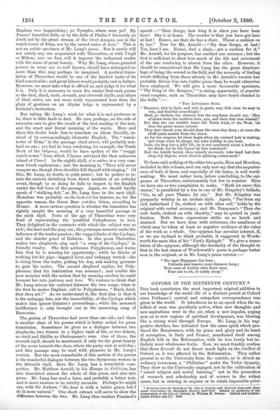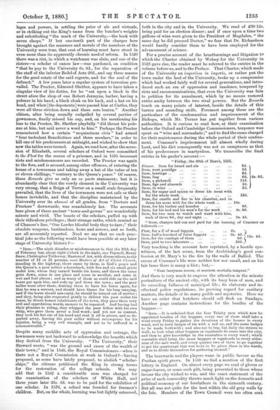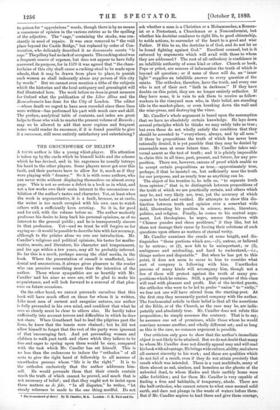OXFORD IN THE SIXTEENTH CENTURY.*
THIS book constitutes the most important original addition to our knowledge of the social life of a distinct period at Oxford since Prideaux's cynical and outspoken correspondence was given to the world. It introduces us to an epoch when the in- tellect of man was peculiarly active, when new thoughts and new aspirations were in the air, when a new impulse, urging men on to new regions of spiritual development, was blowing like a strong wind through Europe. Mr. Lang, in his sug- gestive sketches, has indicated how the same spirit which pro- duced the Renaissance, with its grace and glory and its heart of corruption, in Italy and France, manifested itself among English folk in the Reformation, with its less lovely but in- finitely more wholesome fruits. Now, we must frankly confess that these Records do not throw much light on the intellect of Oxford, as it was affected by the Reformation. They rather present to us the University from the outside, as it struck an ordinary townsman, a " Philistine " under the Tudor dynasty. They show us the University engaged, not in the cultivation of "sound religion and useful learning," not in the promotion of research, and scholarship and of science in the widest sense, but in striving to acquire or to retain impossible privi- • Selections from Me Records of Me Oily of Oxford, with Extracts from OMIT DOCII. meets illostratinv the Municipal History,1509 1533. Edited, by Authority of the Corporation of the City of Oxford, by William H. Turner. Oxford and London: James Parker and Co. 1880. leges and powers, in settling the price of ale and victuals, or in striking out the King's name from the butcher's weights and substituting "the mark of the University,—the book with seven clasps." If but one-tenth part of the charges here brought against the manners and morals of the members of the University were true, that seat of learning must have stood in even more than its apparently chronic need of reform. In 1520 there was a riot, in which a watchman was slain, and one of the rioters—a scholar of canon law—was pardoned, on condition "that he pay to the University 6s. 8d., for the reparation of the staff of the inferior Bedel of Arts 20d., and say three masses for the good estate of the said regents, and for the soul of the defunct." A few years later a regular system of terrorism pre- vailed. The Proctor, Edmund Shether, appears to have taken a singular view of his duties, for he "sat upon a block in the street afore the shop of one Robert Jermyns, barber, having a poleaxe in his hand, a black cloak on his back, and a hat on his head, and when [the deponents] were passed him at Carfax, they were all three stricken down and there sore beaten." Another citizen, after being soundly cudgelled by several parties of gownsmen, finally missed his cap, and, on his mentioning his loss to the Proctor, Mr. Shether playfully "did thrust his pole- axe at him, but said never a ward to him." Perhaps the Proctor remembered how a certain " nequissimus civis " had armed "four turbulent Benedictines and three seculars," in order to kill one of his predecessors at midnight, and wished to show that now the tables were turned. Again, we read how, after the acces- sion of Elizabeth, several scholars of Oxford were committed to the Fleet for the rescue of a prisoner, and in 1595 incessant riots and misdemeanours are recorded. The Proctor was again to the fore, and is accused, among other offences, of entering the house of a townsman and taking away a hat of the value of ten or eleven shillings, "contrary to the Queen's peace." Of course, these Records give us only an as parts statement; but it is abundantly clear that the rowdy element in the University was very strong, that a Reign of Terror on a small scale frequently prevailed, that the lives of the townsmen were not safe or their homes inviolable, and that the discipline maintained by the University over its alumni of all grades, from "Doctors and Proctors" downwards, was scandalously lax. The accounts here given of these ancient " town-and-gowns " are wonderfully minute and vivid. The boasts of the scholars, puffed up with their ridiculous privileges ; their strange oaths, which remind us of Chaucer's line, "Our Lordes blissful body they to-tare ;" their obsolete weapons, ba,stinadoes, bows and arrows, and so forth, are all accurately reported. Need we say that no such prac- tical joke as the following would have been possible at any later stage of University history P- " Item.—The ninth disorder or misdemeanour is, that the 10th day of February last, about eight o'clock in the night, one Pepwell, lienry Snow, Christopher Toldervey, Masters of Art, with divers others, to the number of 12 or 15 persons, most Masters of Art of Christ Church, standing in the highway, there came by them, in God's peace and the Queen's, a poor miler a-horseback, with five and six small grists under him, whom they turned beside his horse, and threw the same grist down, some in one place and some in another, and some in wet and foul places; and as many of them as could ride on the said horse got upon him, and rode up and down the town ; and the poor miller went after them, desiring them to have his horse again, for that he was a servant, and should have blame for his long tarrying, and if the horse should mis-carry, he should be turned out of service ; and they, being also requested gently to deliver the poor miller his horse, by divers honest inhabitants of the town, they gave them very evil and opprobrious words, unmeet to be repeated. And having had their pleasure in riding, they whipped the poor fellow with his own whip, who gave them never a foul word ; and yet not so content, they took his hat out of his hand and rent it all in pieces, and so de- parted away, leaving the poor miller without recompensa for his injuries, being a very evil example, and not to be suffered in a commonwealth."
Despite many suchlike acts of oppression and outrage, the townsmen were not backward to acknowledge the benefits which they derived from the University. "The University," their Steward wrote, "was the ground and cause of the wealth of their town ;" and in 1548, the Royal Commissioners—when is there not a Royal Commission at work in Oxford ?—having proposed, as some have lately proposed, to abolish "scholar- ships," the citizens petitioned the King in strong terms for the restoration of the college schools. We may add that in 1562 a considerable sum was charged for the examination of the scholars of White Hall, and three years later 33s. 6d. was to be paid for the exhibition of one scholar. In 1576, a school was founded for freemen's children. But, on the whole, learning was but lightly esteemed,
both in the city and in the University. We read of £30 12s. being paid for an election dinner; and if once upon a time two gallons of wine were given to the President of Magdalen, "the same day he did proceed Doctor," we fear that Dr. Richardson would hardly consider them to have been employed for the advancement of science.
For a precise account of the heartburnings and litigation to which the Charter obtained by Wolsey for the University in 1523 gave rise, the reader must be referred to the entries in the volume before us, and to the Preface. That Charter, which made of the University an imperium in imperio, or rather put the town under the heel of the University, broke up a compromise which had worked fairly well for several generations, and intro- duced such an era of oppression and insolence, tempered by riots and excommunications, that even the University was fain to petition for its annulment, which by no means restored entire amity between the two rival powers. But the Records touch on many points of interest, beside the details of this barren and unending strife. Foremost among these are the particulars of the condemnation and imprisonment of the Bishops, which Mr. Turner has put together from various authorities. It is curious to read how, at their examination before the Oxford and Cambridge Commissioners, tenpence was spent on "wine and marmalade ;" and to find the sums charged for their maintenance during the whole period of their confine- ment. Craumer's imprisonment fell almost wholly during Lent, and his diet consequently was not so sumptuous as that of his predecessors in martyrdom. We transcribe the final entries in his gaoler's account :— "Friday, the 20th of March, 1555.
Dinner. Item for bread and ale ... 8d.
11d. 6d. 12s. Bd. 2d. Item, wort porridge ... 3d.
Item, herrings... ... 3d.
2d. Item, a pickerell Item, figs and almonds Item, in wine Item, for sugar and spices to dress his meat with for the whole week... ...
Item, for candle and fire in his chamber, and to dress his meat with for the whole week ... 10s. Item, for his barber and launder Item, for his bed and his men's for the week ... 48. 8d. Item, for two men to watch and ward with him, each of them 8d., day and night ... Os. 4d.
"Item, charges laid out and paid for the burning of Creamer as followeth :— First, for a C of wood faggots ... 6s.
Item, half-a-hundred of furze faggots ... 3s. 46.
Item, for the carriage of them ... 86. lls. 4d. ...
Item, paid to two labourers ... 16d.
Very touching is the account here reprinted, by a hostile eye- witness, of the last scene, from the Archbishop's good con-
fession at St. Mary's to the fire by the walls of Balliol. The errors of Cranmer's life were neither few nor small, and on his fair fame there is many a blot; but,— " Sunt lacrymae rerum, et mentem mortalia tangunt."
And there is very much to engross the attention in the minute portraiture of the ancient city, with its busy hum of men, and its exceeding fullness of municipal life ; its elaborate and in- effectual police regulations, its growing regard for sanitary matters, the details of its many guilds and mysteries. Here we have an order that butchers should sell flesh on Sundays. Another page contains instructions for the beadles of the beggars :—
"Item.—It is ordained that the four Trinity men which now be appointed beadles of the beggars, every one of them shall take a ward every Friday to gather the devotions of the houses in every ward, and to have badges of tin with a red ox, and the same badges to be made forthwith ; and also not to beg, but daily thorn streetsto walk, to look what other beggars or vagabonds do come into the city, and then to give knowledge to the constables in every ward ; which constable shall bring the same beggars or vagabonds to every alder- man of the said ward, and every quarter two of them to go together to get the quarterage that was wont to be given them in the wards, and so to divide themselves for gathering thereof."
The bearwards and the players wane in public favour as the Puritan spirit grows. In 1568 we find a mention of the first lottery in England. On almost every page we read of gloves or sugar-loaves, or some such gift, being presented to those whose favour the city wished to win, and the exact statement of the price of each commodity throws much light on the domestic and political economy of our forefathers in the sixteenth century. But all was not quite for the best within the old grey walls by the Isis. Members of the Town Council were too often sent 12d.
to prison for " opprobrious " words, though there is by no means a consensus of opinion in the various entries as to the spelling of the adjective. The "cage," containing the stocks, was con- stantly in need of repairs. It was once removed to" the void place beyond the Castle Bridge," but replaced by order of Con- vocation, who delicately described it as domuneula vocata "le cage." The pillory had no lack of occupants. The cucking-stool was a frequent source of expense, but does not appear to have fully answered its purpose, for in 1579 it was agreed that "the cham- berlains of this city shall cause a cucking-stool to be made upon wheels, that it may be drawn from place to place, to punish such women as shall indecently abuse any person of this city by words." But we cannot even mention a tithe of the subjects which the historian and the local antiquary and genealogist will find illustrated here. The work before us does in great measure for Oxford what the publication of the Liber Albus and the Remembrancia has done for the City of London. The editor —whose death we regret to have seen recorded since these lines were written—has performed his part with much care and skill. The preface, analytical table of contents, and index are great helps to those who wish to master the present volume of Records; may we be allowed to add that more copious and frequent notes would render its successor, if it is found possible to give it a successor, still more entirely satisfactory and entertaining ?




































 Previous page
Previous page